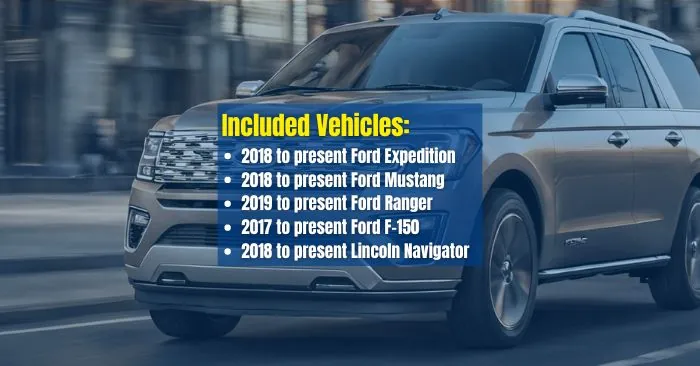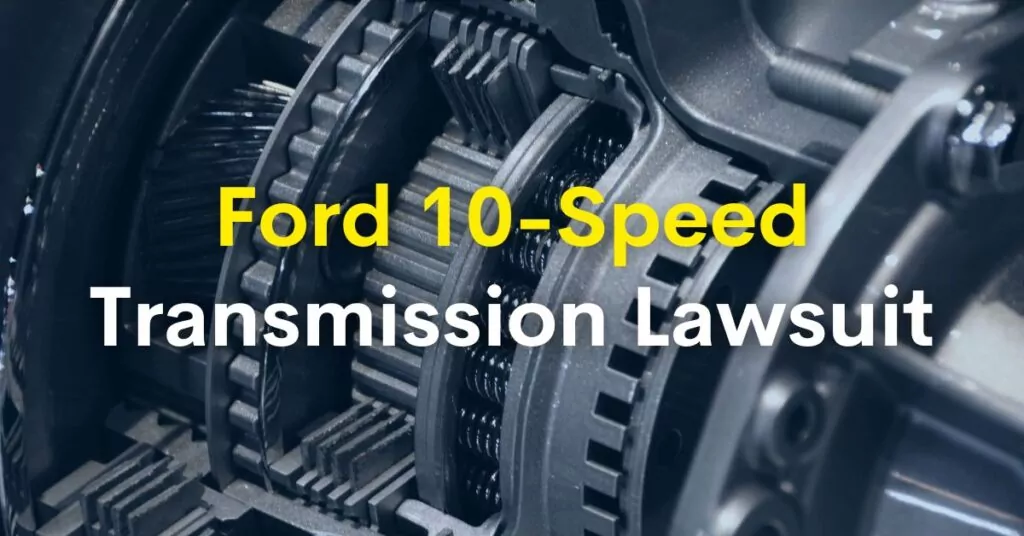Legally reviewed by: Jessica Anvar Stotz, JD, MBA
Ford has long touted the durability of its vehicles with the slogan “Built Ford Tough,” but how well does this hold up when it comes to their transmission systems? Despite the Ford F-series being a top-selling vehicle in America for four decades, it has faced numerous recalls, complaints, and transmission issues.
In the past decade alone, Ford has dealt with a series of transmission problems in multiple models, which have led to class action lawsuits and global recalls on vehicles with 10R80 or 10-speed transmission systems.
Overview of 2023 Ford 10-Speed Transmission Class Action Lawsuit
A Ford 10R80 transmission class action lawsuit filed earlier in April alleges that at least five models equipped with 10-speed transmissions experience jerking, harsh shifting, lunging, clunking, hesitation, and sudden loss of power.
The lawsuit claims that the transmission problems pose a potentially life-threatening safety issue and that Ford allegedly concealed defects in the 10R80 10-speed transmission, stating, “Because of the defect, the class vehicles are likely to suffer serious damages and potentially catch fire if accidents occur, and there is an unreasonable and extreme risk of serious bodily harm or death to the vehicle’s occupants and others in the vicinity.”
Potential Compensation if You’re Having Trouble With Your Ford Transmission
| Affected Vehicle | Average Lemon Law Settlement |
| 2019-2024 Ford Ranger | $57,907 |
| 2018-2024 Ford Mustang | $69,431 |
| 2017-2024 Ford F-150 | $93,567 |
| 2018-2024 Ford Expedition | $115,190 |
| 2018-2024 Lincoln Navigator | $157,976 |
*Please note, the figures presented in the chart are approximations based on past case results and should not be interpreted as a prediction or guarantee. Each case is unique and requires personalized legal guidance.
Is this the only Ford Transmission Lawsuit involving the 10R80?
No, Ford Motor Company is currently facing several different class-action lawsuits due to safety concerns surrounding their 10R80 10-speed automatic transmission, which is used in multiple vehicle models. Plaintiffs claim that this transmission can cause “life-threatening” issues such as harsh shifting, jerking, hesitation, and slipped gears.
Despite being aware of these safety concerns, Ford allegedly continued to ship and sell vehicles equipped with the 10R80 transmission without issuing a complete recall.
One of the most significant lawsuits, Marino et al. v. Ford Motor Company, involved a plaintiff who leased a Ford F-150 XLT that exhibited loud noises and power loss just two months after leasing the vehicle due to transmission issues.
Similarly, Orndorff et al. v. Ford Motor Company was filed in Pennsylvania, where the plaintiff claimed that their F-150 SuperCab began making clunking noises from the 10-speed transmission after just 6,000 miles. The dealership allegedly told the plaintiff that the jerking and gear slipping were “normal” for cars with 10R80 transmissions.
Several Ford drivers have reportedly suffered whiplash due to the erratic shifting and jerking of Ford vehicles equipped with the 10R80 transmission.
How to Fix the Ford 10 Speed Transmission Issue
Ford Motor Company, in response to the 10 Speed Transmission Recall, has introduced a possible solution to address the issues associated with their 10-speed automatic transmission, specifically the 10R80 model.
This fix is particularly aimed at mitigating the harsh or delayed engagement and shifting problems experienced by certain models.
Drivers of affected Ford vehicles have reported problems with harsh or delayed engagement and shifting, often accompanied by an illuminated malfunction indicator light (MIL) and diagnostic trouble codes (DTCs) such as P0751, P0752, P0756, P0757, and others.
These issues are mainly caused by the transmission solenoid ID strategy, sticking valves in the main control valve body, and axial movement of the CDF clutch cylinder sleeve.
To address these issues, Ford has issued Technical Service Bulletin (TSB) 24-2101, dated March 28, 2024, which outlines the necessary steps to identify and correct the transmission problems.
The service procedure involves inspecting and potentially replacing various parts within the transmission system. The repair process may require replacing several specific components, including:
- Solenoid Retaining Plate Bolt (W712658-S439)
- Solenoid Retaining Clips (HL3Z-7G007-A)
- Park Override Bolt (JL1Z-7N134-A for Expedition/Navigator)
- Motorcraft® MERCON® ULV Automatic Transmission Fluid (XT-12-QULV)
Other parts such as fluid pan gaskets, fluid filters, transmission fluid filter seals, auxiliary pump tube O-rings, channel plates, and various clutch-related components might need inspection and replacement if found defective.
The TSB includes an exhaustive list of parts, many of which are categorized based on their need during the inspection and repair process. For instance, the main control overhaul parts are mandatory for all affected vehicles, while other components, like the fluid filter and separator plates, are to be replaced only if necessary.
The bulletin specifies distinct parts for each vehicle model and transmission type, ensuring that technicians have precise guidelines on what to replace.
Partial dismissal of previous Ford 10-Speed Transmission Lawsuit
One of these lawsuits was partially dismissed in November 2020 in the Illinois Supreme Court (O’Connor, et al., v. Ford Motor Company.). Ford filed a motion to dismiss the 10-speed transmission case and a federal judge agreed.
The automaker asserts that express and implied warranty claims don’t hold up in this case because the F-150 truck owner did not notify Ford of alleged breach of warranties prior to bringing their complaint to the court. Additionally, the judge dismissed the claim that Ford engaged in deceptive trade practices, saying that the allegations were too “generalized.” The case will continue, however, because the judge did not dismiss all the claims.
The other lawsuits against Ford in both Massachusetts and Pennsylvania remain pending, so settlements are still possible. The manufacturer also revealed that it had already spent $47.4 million on vehicle buybacks. Evidently, the automaker has had major mechanical troubles with vehicles across its lineup in recent years.
Did the manufacturer release a Ford 10-Speed Transmission Recall?
Ford has issued various different recalls on the 10-Speed Transmission system over the years. The manufacturer has also released several Technical Service Bulletins (TSBs) to Ford dealerships to address this issue.
Drivers of affected vehicles, however, claim that these recalls have not resulted in permanent fixes to the transmission’s issues. In fact, some owners have reported experiencing similar issues even after their vehicles were repaired under a Ford 10-speed transmission recall.

Which models include the Ford 10R80 Transmission?
- 2018 to present Ford Expedition
- 2018 to present Ford Mustang
- 2019 to present Ford Ranger
- 2017 to present Ford F-150
- 2018 to present Lincoln Navigator
Has Ford fixed the 10-speed transmission problems?
Ford has been addressing issues with the 10-speed automatic transmission in some of their vehicles, but it appears that they have not yet been able to fully fix the problems. According to Ford, the shifting issues experienced by some drivers are due to the “adaptive transmission shift strategy,” which is intended to improve shift quality by allowing the car’s computer to learn the transmission’s parameters. However, some drivers have reported ongoing issues even after repairs and reprogramming of the control module.
Ford has released several technical service bulletins related to issues with the 10-speed transmission and implemented short-term solutions such as updated clips for the shift cable, replacement of parts in certain models, and performing adaptive learning drive cycles.
However, it appears that these solutions have not fully resolved the issues, as drivers continue to report problems with their vehicles.
What should I do if I have Ford transmission problems?
If you’ve taken your Ford vehicle in for repeat repairs under warranty, your Ford may be considered a “lemon,” and you could be eligible for a refund or cash compensation, as well as the payment of your attorney’s fees and costs. For the past decade, Ford owners have been experiencing various transmission issues in their vehicles and have received little recourse from the company.
Joining a class-action lawsuit may not guarantee compensation for all the issues your vehicle has experienced because these lawsuits provide a solution for a collective group rather than individual issues. A better way to maximize your potential recovery is by filing an individual lemon law claim and opting out of a class action. Don’t get stuck with a vehicle that has defects that could endanger you or your loved ones.
By contacting the Lemon Law Experts, you can receive a free, quick, and confidential case evaluation to see if you qualify for a lemon law claim. Our lemon lawyers have been helping California consumers with successful lemon law claims since 2009 and we can help you get the compensation you deserve. Contact us today to see whether your case qualifies for a refund or cash compensation.





